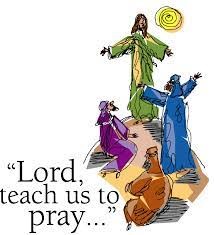Sister Doreen’s Reflections
The Lord’s Prayer: part one

“It is not what you are nor what you have been that God sees with all-merciful eyes, but what you desire to be.” (Cloud of Unknowing)
The Lord’s prayer is given to us in answer to the Disciples question to Jesus: ‘Lord teach us to pray’ – and it is a framework for when we talk with God, even for times when we don’t know the right words to say. They are words said to a warm, personal, loving God who is central in our lives – and in whose presence there is safety. The words begin by recognizing our communal being – “Our Father” – and it becomes ‘our prayer’.
We praise, we ask for what we need, we seek forgiveness and seek to give forgiveness, all as a loving response to God’s love, in intimate communion. It is this relationship – this atmosphere of relationship – that permeates all our interactions, creates a grounding in human solidarity that binds people together. In the forgiveness section of this prayer we see the interaction of love between ourselves and God that transforms into human love toward one another. It is a true experience that in the fact of loving others we enter more deeply into our own experience of God’s love.
In prayer we experience God’s love and respond to this love by discerning the cause (will, desire) of God in human life and marshalling all our energies to serve it – ‘your name be held holy; your Kingdom come; your will be done, on earth as in heaven.” It becomes a conversation between hearts, God’s heart and our heart. We are sons and daughters of God on a mission to bring heaven to earth – that all creation may be filled with joy and peace – all creation everywhere.
John Shea writes in ‘Following Jesus’: “Prayer includes traditional praise and gratitude, an occasional scream for help, a fervent petition now and then, and some hardnosed bargaining for a better deal. But it does not stop there. It encompasses the confiding of secrets, the admission of fears, the free flow of tears, and ecstatic dance. When you start a conversation with “Abba” anything is liable to happen.”
Matt 6:9-13 (NRSV)
Pray then in this way:
Our Father in heaven, hallowed be your name.
Your kingdom come. Your will be done, on earth as it is in heaven.
Give us this day our daily bread.
And forgive us our debts, as we also have forgiven our debtors.
And do not bring us to the time of trial, but rescue us from the evil one.
Luke 11:2-4 (NRSV)
When you pray, say Father, hallowed be your name. your kingdom come.
Give us each day our daily bread.
And forgive us our sins, for we ourselves forgive everyone indebted to us.
And do not bring us to the time of trial.
In the first half of the prayer we express our desire for the fulfillment of God’s divine project (the bringing of heaven to earth for all people and all creation) and we commit to actively participate in it.
In the second half of the prayer we deal with our practical day-to-day needs if we hope to participate in helping fulfill God’s grand desire. Individually and collectively we ask for God’s help – expressing each day four things:
- We ask to be nurtured and fed both in our inner and outer lives
- We need to have our slate clean so that we are unburdened to do our work for God
- We ask to be freed from a state of inner vacillation, confusion, or agitation that we can easily slip into and which can divert or distract us from the true purpose of our lives
- We ask not to become so inward and self-absorbed that we cannot be present to act simply and maturely towards others at the right moment.
Mutual forgiveness is the only specific grace we ask for in the Lord’s prayer. Forgiveness among humans must accompany God’s forgiveness since only in this way can true loving unity or Oneness be achieved. Without daily mutual forgiveness (seven times seventy times) God’s loving desire of total unity can never be complete.
When read in Matthew’s original Greek text the second half of the Lord’s prayer is a fine example of praying in the mindset of Jesus – it is a shift in the person’s attitude toward God, a God who is a loving, nurturing, forgiving, compassionate and protective God. We are to pray confidently.
We are used to praying the four petitions in English as they have been translated from the Latin, implying that we are begging or demanding help from God:
- Give us
- Forgive us
- Lead us not
- Deliver us
When Jesus prays this prayer, these petitions are more an expression of loving gratitude and trust.


